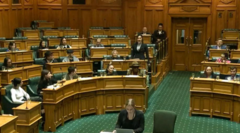Defending the Uncontacted: A Struggle for the Mashco Piro Tribe
Tomas Anez Dos Santos was working in a small clearing in the Peruvian Amazon when he heard footsteps approaching. He quickly felt surrounded and froze. 'One was standing, aiming with an arrow,' he says. 'And somehow he noticed I was here and I started to run.'
This was Tomas's first direct encounter with the Mashco Piro, a tribe that has chosen to remain isolated from the outside world for over a century.
For decades, Tomas lived in the vicinity of these nomadic people without seeing them often. Now, however, they are becoming more visible, relying on the rainforest for their survival.
A recent report by Survival International suggests there are at least 196 uncontacted tribes worldwide, with the Mashco Piro being one of the most prominent. Sadly, the same report estimates that half of these groups could be wiped out within the next decade due to logging, mining, and other external threats.
Villagers like Tomas feel conflicted. They respect the Mashco Piro, referring to them as 'brothers' but also fear the potential violence that could arise from clash, especially as logging activities encroach upon their territory.
Despite the Peruvian government's policy of non-contact, which prohibits initiating interactions with isolated tribes, the line between worlds muddles as logging disrupts the forest and the Mashco Piro families venture closer to settlements.
In a nearby area recognized as a forest reserve, the Mashco Piro are more frequently approached by agents tasked with mediating interactions to prevent conflicts. These agents attend to the needs of the Mashco Piro while upholding the guidelines that respect their choice for isolation.
As they navigate their delicate existence, the Mashco Piro retain a fierce determination to stay connected to their forest home, demonstrating that even amidst change, they long to protect their cultural identity. 'Let them live as they live,' Tomas appeals. 'We can't change their culture.'



















